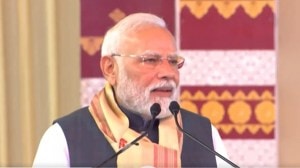16-hour showdown in Madras High Court: High stakes duel over Tamil Nadu minister V Senthil Balaji’s controversial ED arrest
In the ensuing courtroom drama, Mehta, representing ED, and Rohatgi, appearing for Balaji's wife, presented their respective cases before a division bench of Justices J Nisha Banu and D Bharatha Chakravarthy on Monday and Tuesday.
 At the centre of the high-stakes showdown was the controversial arrest of V Senthil Balaji, the power and excise minister of Tamil Nadu, which has provoked an intense debate over the powers and prerogatives of the Enforcement Directorate (ED).
At the centre of the high-stakes showdown was the controversial arrest of V Senthil Balaji, the power and excise minister of Tamil Nadu, which has provoked an intense debate over the powers and prerogatives of the Enforcement Directorate (ED). In an extraordinary marathon hearing lasting more than 16 hours, the Madras High Court witnessed a fascinating duel of legal acumen between Solicitor General Tushar Mehta and former attorney general Mukul Rohatgi.
At the centre of the high-stakes showdown was the controversial arrest of V Senthil Balaji, the power and excise minister of Tamil Nadu, which has provoked an intense debate over the powers and prerogatives of the Enforcement Directorate (ED).
The case surrounds ED’s arrest of Balaji, carried out early on June 14 after an exhausting 18-hour search of the minister’s official residence and office in Chennai, in relation to an alleged job scam. Following his midnight arrest, Balaji was reported to have developed chest pain and was swiftly rushed to a city hospital. Medical examinations revealed a severe heart condition necessitating immediate bypass surgery.
Balaji opted for a private hospital in Chennai, his preferred choice, where the surgery was carried out last week. Casting aspersions on the authenticity of the minister’s health condition at the Supreme Court, ED sought his custody and made assertive moves against Balaji’s surgery at the private hospital.
In the ensuing courtroom drama, Mehta, representing ED, and Rohatgi, appearing for Balaji’s wife, presented their respective cases before a division bench of Justices J Nisha Banu and D Bharatha Chakravarthy on Monday and Tuesday.
Central to the case was the question of whether ED had the authority to arrest without a pre-arrest notice and the subsequent right to seek custody of the individual arrested. Mehta defended the agency’s stance, arguing that under the Prevention of Money Laundering Act (PMLA), ED possessed comprehensive authority to arrest a person, if it believed that the person was punishable under the Act.
Balaji’s wife, in an additional petition before the court, detailed alleged violations of procedures and laws in the arrest, remand, and subsequent detention of the minister by ED. She said the arrest was carried out by ED with the Rapid Action Force’s assistance.
“His friends and relatives, who were present there, were driven out of the house and the main gates were closed and heavily guarded by the Rapid Action Force. Nobody knew what was happening inside the house from June 13, 2023, morning 7.45 am to June 14, 2 am. At around 2.30 am, he was taken to Government Omandurar General Hospital, Chennai and was admitted by the ED themselves, due to complaints of chest pain,” she said in her petition.
Balaji’s wife also complained that the arrest violated sections 41, 41A, 50, and 50A of the Code of Criminal Procedure 1973, Sections 19 of the Prevention of Money Laundering Act, and Articles 21 and 22(1) of the Constitution of India. She also submitted that Balaji’s remand to judicial custody by a Principal Sessions court judge “was carried out without considering” Balaji’s objections and due process.
She alleged inconsistency in the Principal Sessions Judge’s orders regarding Balaji’s cooperation during the investigation. “One order grants police custody to ED, asserting Balaji’s non-cooperation, while another dismissal of a bail petition records that Balaji has indeed cooperated,” the petition noted.
ED’s claim that Balaji refused to receive the Arrest Memo, thus delaying the arrest, has been also challenged with the Panchanama records, which were against ED’s claim as the search concluded much earlier than the arrest.
The wife also questioned the validity of ED seeking custody under Section 167 of the Criminal Procedure Code (CrPC), arguing that only a police officer is empowered to do so and ED officials are not considered police. “As per Section 19 of the Prevention of Money Laundering Act 2002, a person’s custody with the ED cannot exceed 24 hours following the arrest,” she said in her petition.
According to Solicitor General Mehta, there was a clear distinction between the power to arrest under PMLA and CrPC. He argued that a pre-arrest notice under Section 41 of CrPC was only required when ED did not want to arrest a person. And that contrarily, in this case, the agency had intended to arrest Balaji from the outset. Under PMLA, a person can be arrested to prevent them from destroying potential evidence, he said.
About charges of the non-communication of arrest during the arrest procedure, Mehta argued that the law demanded the grounds for arrest to be provided ‘as soon as possible’, not necessarily at the moment of arrest. He also pointed out the sessions judge reading out the grounds to the minister during a hospital visit within 11 hours of the arrest.
Mehta also prayed to the court to exclude Balaji’s hospitalisation period while considering the grant of custodial interrogation, arguing that the conditions imposed by the sessions judge made effective interrogation impossible.
Rohatgi, representing Balaji’s wife, argued that no legal provision allows for the exclusion of the period of hospitalisation when granting custodial interrogation. He firmly maintained that “even if there was an earthquake or a pandemic, custodial interrogation cannot be granted beyond 15 days of the arrest of the accused.” He noted that the 15-day period expired on June 28, leaving ED with no legal grounds to seek further custodial interrogation.
Rohatgi also argued that the habeas corpus petition filed by Balaji’s wife was valid, as the arrest and remand had been executed in an illegal and mechanical manner. He questioned the authority of ED to seek custody, reminding that the agency did not function as a conventional police force.
The legal spectacle, involving the country’s two top lawyers, hinges on the Madras HC’s interpretation of the legality of Balaji’s arrest. The final verdict, reserved for now, could not only set a significant precedent regarding ED’s powers and functioning but also matters to Balaji and the DMK. This is because anything against their arguments means a custodial interrogation after Balaji regains health, after a month or two or more, a scenario that the ruling party wouldn’t prefer as he continues to be a ‘minister without portfolio’ in the state cabinet after his arrest.
The riveting exchange concluded on Tuesday with the bench reserving its verdict and directing both counsels to file their written submissions by June 28.








